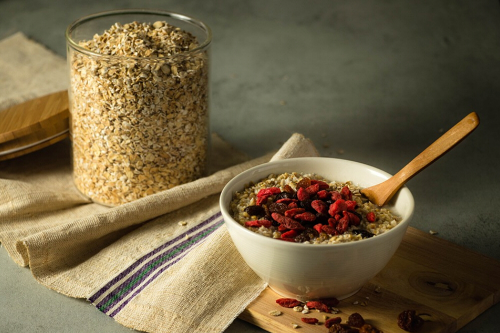Look Before You Eat from the Healthy Snacks Aisle
健康零食,吃前看一看
In Mean Girls, the cult high school comedy written by Tina Fey, the villain Regina George is fooled into eating Swedish nutrition bars to lose weight because they “just burn up all your carbs”. She takes some time to realise that her supposedly healthy snack is having the opposite effect.
在蒂娜·费(Tina Fey)制作的高中校园喜剧《贱女孩》(Mean Girls)中,反面人物雷吉娜·乔治(Regina George)被骗吃瑞典营养棒来减肥,因为它们“会燃烧掉你所有的碳水化合物”。她花了一些时间才明白,她吃的所谓的健康零食有着相反的效果。
The film was ahead of its time in 2004, for appetites are now insatiable for snacks that do you good. Supermarkets are filled with protein and fruit bars, rice cakes and gluten-free tortilla chips, many made by small brands. “Guilt-free and delicious,” promises one fruit bar. “Ingredients you can see and pronounce,” says another from Kind Snacks, the “healthy snacking leader” in which Mars has a stake.
在2004年,这部影片走在了时代的前面,因为现在人们对那些对身体有益的零食的欲望毫无止境。超市里充斥着蛋白棒和水果棒、米饼和无麸质玉米片,很多由小品牌生产。一种水果棒承诺说:“没有负罪感,而且美味可口”。另一种来自“健康零食领军企业”Kind Snacks的商品说:“你可以看到配料名称并且念出来。”玛氏(Mars)持有Kind Snacks部分股权。
Mondelez, the confectionery and snack group spun off from Kraft Foods, which owns Cadbury chocolate and Oreo cookies, is a convert to the trend. It said this week that it intends to create and acquire more healthy snack brands, reinvesting some of the $10bn investment it currently holds in coffee companies. Mondelez bought Perfect Snacks, a US maker of refrigerated protein bars, last year.
亿滋(Mondelez)热衷这种趋势。这家糖果和零食公司分拆自卡夫食品(Kraft Foods),卡夫拥有吉百利(Cadbury)巧克力和奥利奥(Oreo)饼干品牌。亿滋最近表示,计划创建和收购更多健康零食品牌,将目前对咖啡公司的100亿美元投资中的一部分用于再投资。去年,亿滋收购美国冷藏蛋白棒制造商Perfect Snacks。
It is a profitable time for a second helping. The Covid pandemic has been good to Mondelez and PepsiCo, another of the world’s biggest snack groups. As people went into lockdown, they reached for the biscuit tin and the cookie jar; Kantar, the research group, found that snacking “occasions” (also known as not waiting for the next meal) rose the longer it lasted.
现在零食业迎来了一段利润丰厚的时期。新冠疫情有利于亿滋和另一家全球最大零食集团百事公司(PepsiCo)。当人们被迫宅在家时,他们会伸手去拿饼干盒和曲奇罐;研究机构Kantar发现,疫情持续的时间越长,吃零食的“场合”(也就是不等下一餐)越多。
But are we all Regina George now, believing that we can graze healthily, when really it’s just over-eating? A lot rests on the answer, since snacking has become such an integral part of modern eating. Rushing to work with a cereal bar instead of eating breakfast, or taking a mid-afternoon break with a biscuit: many lives are now built around snacks as much as meals.
但我们现在是否都像瑞吉娜·乔治那样,认为我们可以吃得健康,而实际上只是在暴饮暴食?有很多东西取决于这个答案,因为吃零食已成为现代饮食不可分割的一部分。不吃早餐,而是带一块麦片棒上班,或者下午休息时吃块饼干:现在很多人的生活中,零食和正餐一样重要。

Americans and the British are leading snackers but the trend towards eating several small meals instead of three big ones is global, if adapted to local tastes. Dried fish and squid strips are on offer in Japanese convenience stores, nearby the peanuts and crisps. Mondelez reports a rise of 18 per cent in “snacking occasions globally” between 2015 and 2017.
美国人和英国人最爱吃零食,但现在少食多餐,而不是一天三顿正餐是全球趋势,有时候还配合地方口味。日本便利店会出售鱼干和鱿鱼丝,旁边放着花生和薯片。亿滋报告,2015年到2017年,全球“零食场合”增加18%。
It is a generational change, as well as one of lifestyle. Millennials are keen on snacks – seven out of 10 said they preferred multiple small meals in one survey – as are teenagers. But they are also cynical about corporations, weary of old brands and choosy about ingredients.
这是一种代际变化,也是生活方式的变化。千禧一代喜欢吃零食(在一项调查中,70%的受访者表示他们更喜欢少食多餐),青少年也是如此。但他们还对企业持怀疑态度,他们厌倦老品牌,对配料十分挑剔。
Small brands, many founded by millennials, spotted this faster than companies such as Kraft. “Snacking Without Compromise” is the slogan of Texas-based Amplify Brands, which makes SkinnyPop popcorn and Pirate’s Booty rice and corn puffs, and was acquired by Hershey in 2017. Consumers are “used to deciding between what we really want and what is good for us. At Amplify, we don’t believe it needs to be that way,” it promises.
很多由千禧一代创建的小品牌比卡夫等公司更快地意识到这点。“不妥协地吃零食”是总部位于得克萨斯州的Amplify Brands的口号。该公司生产SkinnyPop爆米花和Pirate’s Booty大米玉米泡芙,2017年被好时(Hershey)收购。Amplify Brands承诺,消费者“习惯于在我们真正想吃的食物和对我们身体有益的食物之间做决定。在Amplify,我们认为不需要这样。”
Amplify knows its millennial snackers. In a study in 2017, it identified the qualities they crave. Most believe that the fewer ingredients in a snack, the better, and recoil at trans fats or added sugar. They like labels such as “gluten-free”, “allergen-free” and “vegan” and want responsibly sourced food. They are also willing to pay higher prices for guilt-free pleasure.
Amplify了解“千禧一代”的零食消费者。在2017年的一项研究中,该公司确定了他们想要的品质。多数人认为零食中的配料越少越好,他们害怕反式脂肪和添加蔗糖。他们喜欢“不含麸质”“不过敏”和“纯素食”等标签,他们想要以负责任方式采购的食品。他们还愿意为没有负罪感的快乐支付更高价格。
Hunger for healthy snacks has produced a cornucopia of unusual treats to pop in the mouth. At my local Sainsbury’s supermarket in east London, the cereal bars, crackers and puffs take up as much space as the biscuits, and put the soda and sweet drinks aisle to shame. Baked corn snacks, crispbread, beef biltong and oatcakes jostle for attention with crispy seaweed.
对健康零食的渴望让大量不同寻常的零食进入我们的口中。在伦敦东部,我附近的森宝利(Sainsbury’s)超市里,谷物棒、脆饼干和泡芙占用的货架空间与甜饼干一样多,让苏打水和甜饮料的货架相形见绌。烤玉米零食、薄脆饼干、牛肉干和燕麦饼与香脆海苔争夺消费者的注意力。
They all look healthier than the Oreos opposite, but they warrant close examination. The Nakd Cocoa Delight fruit and nut bar that I ate for research contains dates, cashews, raisins and cocoa with “a hint of natural flavouring” and “no added sugar or syrups”. It was delicious, but it also turned out to have 15.9 grammes – about two heaped teaspoons – of natural sugars.
它们看上去都比对面的奥利奥之流更健康,但值得认真研究。我为研究而食用的Nakd Cocoa Delight水果坚果棒含有枣、腰果、葡萄干和可可,还有“少许天然食用香料”,“不添加糖或糖浆”。它很美味,但事实证明它还含有15.9克的天然糖,大约两大茶匙。
The calories soon mount up from snacking, even of the healthier kind: almost a quarter of Americans’ daily energy intake now comes from snacks. The fact that they are often eaten alone also reduces the social pressure to stop before finishing off the baked puff bag. A treat can become a habit and what Mondelez calls “permissible indulgence” may turn permissive.
吃完零食,卡路里会很快上升,即便是较为健康的零食:现在美国人每天近四分之一的能量摄入来自零食。人们通常独自吃零食,这将降低社会压力——这种压力会让我们在吃完一袋烤泡芙之前就停下来。吃零食会变成习惯,亿滋所说的“可允许的放纵”可能会变成自由放纵。
Snacking need not be pernicious – some studies have found that there are metabolic advantages to nibbling regularly through the day, rather than overindulging out of hunger at meal times. One Italian study last year concluded that the “optimal pattern” was three meals and two snacks a day (it was funded by the food group Danone, but written by academics).
吃零食不一定有害,一些研究发现,在一天之中有规律的小口吃零食比在饭点因为饥饿而暴饮暴食更有利于新陈代谢。去年,意大利的一项研究得出结论,“最优模式”是每天三顿正餐,外加两餐零食(这项研究由食品集团达能(Danone)资助,但由学者撰写)。
But nor is it coincidence that a global increase in obesity has accompanied the rise of snacking. “Snack Mindfully,” is Mondelez’s response, to be placed on all its labelling by 2025 (“Chew thoroughly. Finish one bite before starting the next”). When choosing a “healthy snack”, it also pays to look before you eat. That would have spared Regina George a lot of angst.
然而,全球肥胖人口增加与吃零食增多同时发生并非巧合。亿滋的回答是:“吃零食时要谨慎”。这句话将在2025年之前印在该公司所有产品的标签上(“充分咀嚼。吃完一口再吃下一口”)。在选择“健康零食”时,吃之前看一看还是有用的。这样会让瑞吉娜·乔治省去很多焦虑。
英文、中文版本下载:http://www.yingyushijie.com/shop/source/detail/id/2610.html








